MajorTypes of Hydroponic
methods

Nutrient Film Technique (NFT)
NFT is a very water-efficient method that continually moves a thin layer of nutrient-rich water over the roots of plants to provide a steady supply of nutrients and oxygen

Deep Water Culture (DWC)
In DWC, plant roots are suspended in a nutritional solution in a reservoir or tank. The roots are given oxygen using an air pump and air stones to avoid asphyxia.
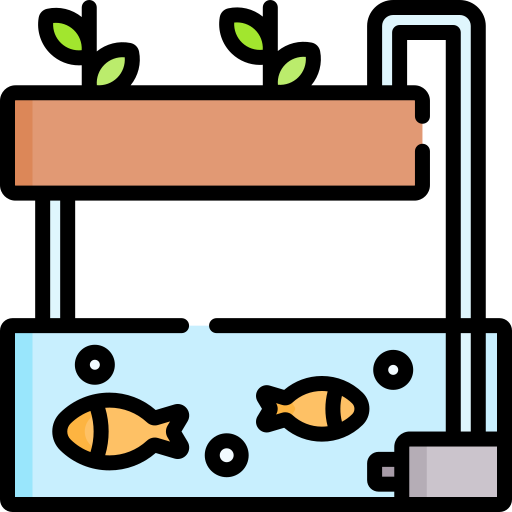
Aeroponics
In aeroponics, a nutrient solution is misted onto plant roots that are suspended in the air. It is among the most effective techniques because it maximizes nutrition and oxygen absorption.

Vertical Hydroponics
Plants are stacked in vertical layers or columns using vertical hydroponic systems. They are perfect for urban farming or other settings when space is at a premium.
Explore More About Hydroponic Methods
- Nutrient Film Technique
- Deep Water Culture
- Aeroponics
- Vertical Hydroponics
-
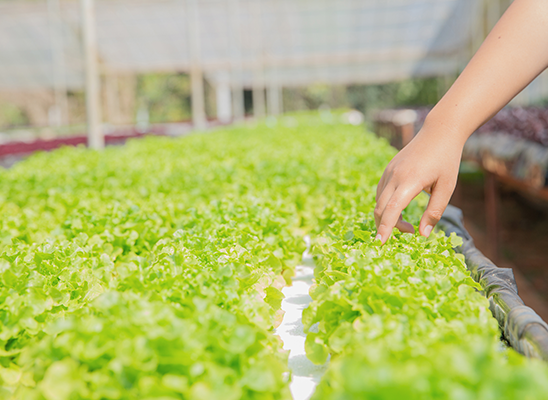
The Art Of Nutrient-Rich Flow For Thriving Plants
NFT is a hydroponic technique where plant roots are supported by a sloping channel or gutter and a thin, continuous film of nutrient-rich water is circulated over them. This technique keeps a thin layer of water on the roots while supplying them with a steady supply of nutrients and oxygen. NFT uses less water and is ideal for growing smaller, quick-growing plants like lettuce and herbs. It is favored by farmers seeking a technology that conserves space and resources because of its ease of use and applicability for indoor or urban hydroponic systems.
-
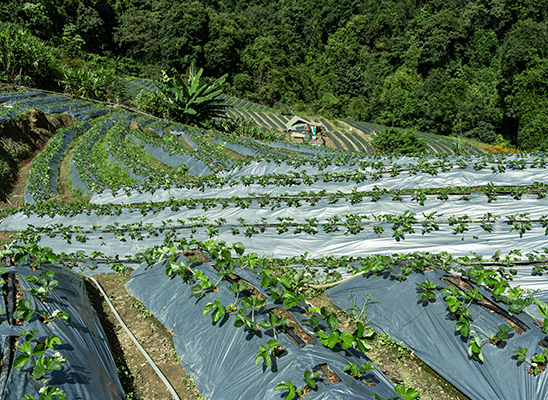
Effortless Plant Prosperity: DWC Unleashes Hydroponic Potential
in a reservoir or tank, plant roots are suspended in a nutrient-rich solution as part of DWC. To oxygenate the fluid and avoid root suffocation, an air pump and air stones are utilized. Larger plants like tomatoes and peppers are well suited to this technique due to its simplicity and proven ability to promote rapid plant growth. Due to its simplicity of use and excellent yields, DWC is a preferred option in both industrial and domestic hydroponic systems.
-
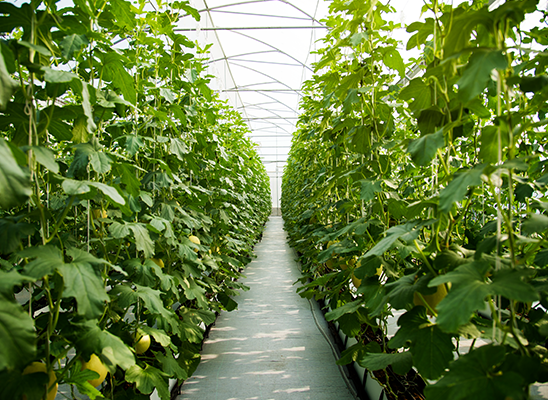
Aeroponics Mastery: Where Plant Roots Dance In Misty Air
A nutrient solution is given to plant roots via an aerosol or fine mist in the advanced hydroponic technique known as aeroponics. This system gives the roots plenty of oxygen, which improves nutrient absorption and encourages brisk development. For research, high-value crops, and circumstances where water conservation is essential, aeroponics is especially ideal. Compared to other hydroponic techniques, it is renowned for producing plants with quicker growth rates and higher yields.
-
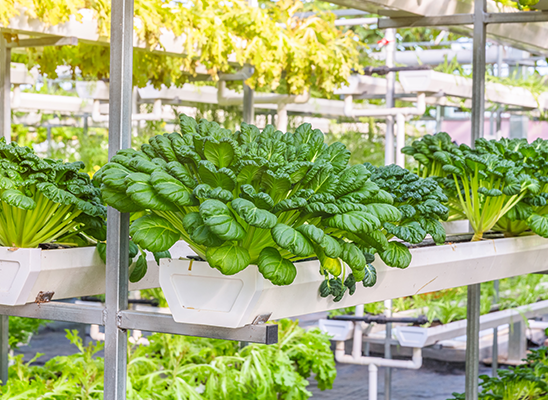
Grow Upward With Vertical Hydroponics: Farming's Future
Vertical hydroponic systems allow gardeners to make the most of limited space and boost crop production density by stacking plants in vertical layers or columns. These systems can make use of a variety of hydroponic methods, including NFT, DWC, or aeroponics. Urban agriculture and places with little available land are two areas where vertical hydroponics is prevalent. It is a sustainable and space-saving alternative for modern agriculture, especially in urban settings, because it makes optimal use of available space, provides regulated environments, and allows for year-round production
-

Gated Community Farms
-

High Value trees
-

Water Management
-

Proper Electricity Connection
-

Man Power Support
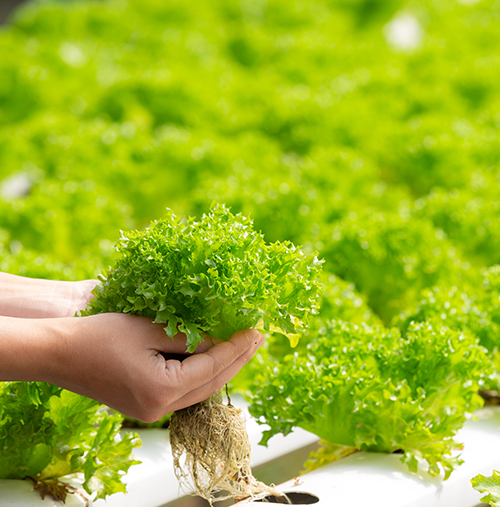
Setting up hydroponics: Equip, build and nurture your soil-less oasis
Depending on your crop and space needs, choose an appropriate way to set up a hydroponic system, such as NFT, DWC, or aeroponics. The necessary tools, including containers, pumps, air stones, grow lights, and a nutrient solution, should be secured. Establish a regulated atmosphere with the right lighting, humidity, and temperature. Create a plant support structure, pick a suitable growing medium, and add your chosen plants to the system. The pH and nutrient levels of the nutrition solution should be regularly monitored and managed. Make sure the roots are receiving enough oxygen, then set up a timer or automated method to distribute nutrients.
Precision In Your Hands: Tools For Hydroponic Success
pH Meter : Monitoring and maintaining the pH of the nutrition solution requires the use of a pH meter. To achieve optimum nutrient uptake and plant health, it's crucial to constantly test and adjust the pH because different plants flourish in particular pH ranges..
EC/TDS Meter : The amount of nutrients present in the water is determined using a TDS or Electrical Conductivity (EC) meter. It ensures that the fertilizer solution contains the ideal ratio of crucial minerals for the particular crop cultivation.
Grow Light : High-quality grow lights are essential when installing a hydroponic system indoors. They offer the essential light spectrum for photosynthesis in the absence of sufficient sunshine. To promote healthy plant development, LED or High-Intensity Discharge (HID) lights are frequently employed in hydroponic farming.


Consistent Crop Yields
Precise environmental control over elements like temperature, humidity, and light is possible with hydroponic systems. This control results in consistent and predictable agricultural yields, enabling the yearly generation of consistent income and maximizing your profits.

Quick Crop Turnaround
Crops grown hydroponically typically grow more quickly than their equivalents grown in soil. Your ability to have many crop cycles in a single year thanks to this increased growth rate raises the potential overall income from your hydroponic farm setup.

Urban and Local Demand
Urban gardening is especially suited to hydroponics. Fresh produce cultivated nearby is increasingly in demand as urbanization expands. Hydroponic farms located close to cities can take advantage of this need and build successful client connections.
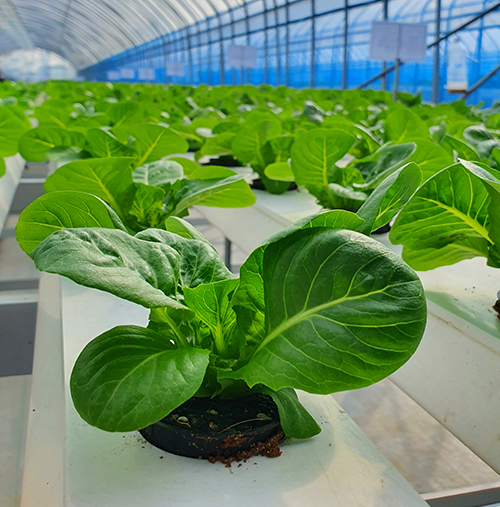
Hydroponic farming: Growing income with precision and consistency
Due to its many benefits and possibilities for year-round cultivation, hydroponic farming has become a promising means of making money. Hydroponics offers several ways to make money, whether you're an experienced farmer trying to diversify your sources of income or an aspiring grower ready to use this cutting-edge technique..
FAQ
Discover solutions in our comprehensive
FAQ database
-
What are the benefits of hydroponic farming?
Hydroponic farm setup conserves water, reduces soil-borne diseases, maximizes space, allows year-round cultivation, and offers precise nutrient control for healthier crops.
-
What are the different hydroponic methods?
Common hydroponic methods include NFT (Nutrient Film Technique), DWC (Deep Water Culture), aeroponics, and vertical hydroponics, each with its unique approach to nutrient delivery and plant support.
-
How do I choose the right hydroponic method for my crops?
The choice depends on crop type, space availability, and resource considerations. Consulting with hydroponic experts, like Scouts Farm, can help you make an informed decision.
-
Can I grow a variety of crops hydroponically?
Yes, hydroponics accommodates a wide range of crops, from leafy greens and herbs to tomatoes, cucumbers, and even fruit-bearing plants, provided the system is tailored to their needs.
-
Can I achieve profitability with hydroponic farming?
Yes, hydroponic farming offers income potential through year-round production, high-quality crops, and access to urban and niche markets. Success depends on crop selection, management, and market research. Consulting with experts like Scouts Farm can help maximize profitability.

